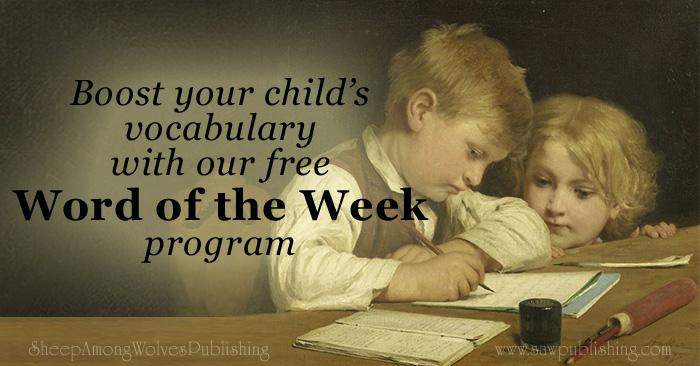How to Give Your Kids a Solid Grasp of Grammar
 As a writer, I am expected to like English. That’s fair, I guess, and it’s also true. I do like English—I even like grammar in moderation. But that wasn’t always the case.
As a writer, I am expected to like English. That’s fair, I guess, and it’s also true. I do like English—I even like grammar in moderation. But that wasn’t always the case.
In elementary school, I hated grammar—I really did. I hated the three-point essay on my favourite colours most of all. The only thing I didn’t hate was learning the fun little “jingles” which the course used to teach the definitions of the parts of speech.
Oh, and I loved reading, of course. I loved learning new words, and better understanding old ones. I loved stretching my abilities to comprehend sentences and ideas that were just beyond my range. I loved using my newly acquired vocabulary in sentences of my own. I felt so pleased when I used them appropriately and accurately.
But that wasn’t grammar—oh, no—that was reading. You could love reading and hate grammar—of course you could. They weren’t the same thing, at all. Or, were they?
Great Books Teach Grammar More Easily than Formal Courses
Most Christian homeschoolers are aware that the force of example is very strong. Oftentimes this is one of the primary reasons for keeping children in an environment where godly examples prevail, rather than trying to correct the negative examples of a secular educational environment by Christian teaching during evenings and weekends. This same principle concerning the strength of example carries over into the way we teach subjects at home.
“Actions speak louder than words,” is an axiom which applies just as much to grammar as to any other subject.
Great books which model a solid grasp of grammar are more potent to mold a child’s use of English than the rules and definitions memorized in formal grammar. What we see and hear has a stronger impact than what is merely taught, even when the teaching is accompanied by plenty of practice and textbook examples.
Great Books Make Grammar Second Nature
The ultimate goal of any grammar course is to equip students to speak and write correctly.
When we study formal grammar, we become familiar with the rules of good English. When we study great literature, we become familiar with the instinct of good English. In the stress of daily life it will be the instinct, not the rule, which dictates a person’s speech.
The grammar that we are constantly exposed to, eventually becomes our standard of grammar. We don’t really think about whether it is correct or not, but subconsciously allow it to become second nature. This second nature is, after all, what every grammar course is aiming at.
 Great Books Give Grammar a Positive Connotation
Great Books Give Grammar a Positive Connotation
While this fact may be more of a default than anything else, it is true that formal grammar is a heavy, mentally demanding subject. Consequently, few children enjoy it, while many find it unpleasant or frustrating. This unfortunate association doesn’t help the student to learn, nor does it stimulate a desire for further knowledge.
Great books which model correct grammar, on the other hand, are usually a positive in a child’s mind. This is especially true when the books are read aloud to them, and any barrier caused by the difficulty of reading is removed. Grammar absorbed in this way has a positive association, encouraging the student to love great language, even while unconsciously informing their standard of correct English.
Formal grammar does have a place, but it is much more likely to be internalized by older students whose minds are interested in their work than by younger children who do not go further than learning the rules by rote.
How To Give Your Kids A Solid Grasp of Grammar
So maybe I did always love grammar after all—I just loved learning it in a way that made it fun, relevant and usable. I loved it when I saw it modeled and picked it up bit by bit from the intuition of frequent exposure.
And my thought is, that if we want to give our own children a solid grasp of grammar, the best thing we can do is to give them a solid grasp of literature.
We need to read to them, over and over again, until repetition and association have taught them far more than any formal course hurried through in elementary school ever could.
And then, once they love and understand grammar on a subconscious level, if they come back and learn the “rules”—the whys and wherefores of our wonderful language—I know that they’ll grasp and retain what they learn far better because of their first-hand experience of good and great books.
Are you looking for a way to boost your students’ vocabulary using some of the great literature of the English language? Check out our Word of the Week (WOW) Program:

Looking for a way to choose toys for little ones? Here is a Timeless Tip from the 1840’s for choosing toys that will change your child’s life today.

Looking for Godly literature? We have found several sources of good books that you might be interested in exploring further.

Faithful meterizations of Scripture are a powerful example of Biblical concepts captured in a way that our minds will retain.

